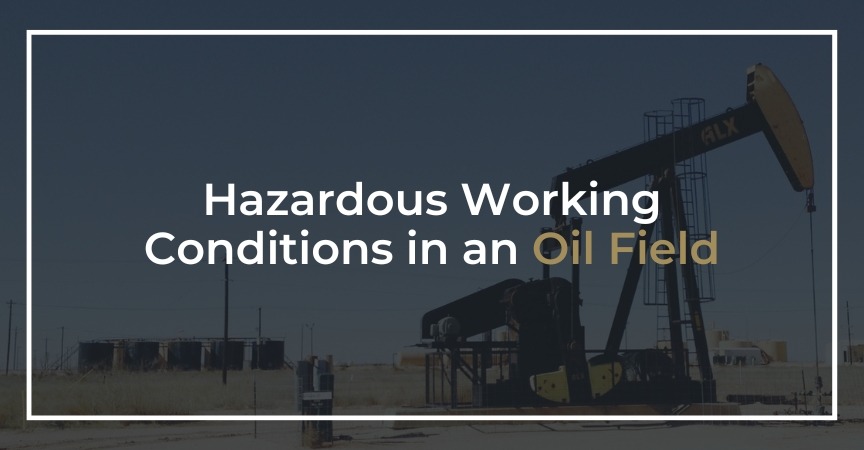Oilfield workers face many hazardous working conditions that can lead to serious accidents. Long hours, and proximity to heavy machinery, scaffolding, and volatile chemicals may contribute to an environment vulnerable to accidents and injuries.
Companies and employers are responsible for the safety and health of their employees. Despite strict working standards set by state and national safety organizations, hundreds of oil field workers are seriously injured or killed on the job each year. When it comes to safety, staying proactive with training and protocols is essential in such a dangerous work environment.
It is important to contact an experienced oil field accident attorney as quickly as possible if you or a loved one have been involved in an oil field accident that resulted in injury or death. The attorneys at The Fitzgerald Law Firm have decades of experience helping injured workers and grieving families understand and pursue their legal rights versus worker’s compensation and company settlement offers.
Wyoming is the United State’s eighth-largest oil-producing state in 2023. With over 10,000 producing oil wells, oil extraction is a large industry across the state, offering thousands of job opportunities. For decades, employee safety organizations such as NIOSH have worked with the U.S. Bureau of Labor Statistics to scrutinize the working conditions in oil fields, tracking the hazardous working conditions that cause catastrophic injury and fatalities.
Reports and data show that the oil field hazards that create the most dangerous working conditions generally stem from the negligence of companies, employers, and supervisors who may skirt training, preparedness, and regulations for profit. Common hazardous working conditions in Wyoming oil fields include:
Untrained or Poorly Trained Employees
Oilfield operators and companies are legally responsible for ensuring that their workers are properly trained and protected to minimize accidents, ensure proper equipment operation, and protect all employees. A poorly trained employee, worker, or supervisor can be a liability to themselves and others. Workers and supervisors must be familiar with all of the extraction processes and machinery they are using, in addition to knowing any risks and hazards before they begin operating equipment.
Misuse or Failure to Use Personal Protection Equipment
One of the most commonly cited Occupational Safety and Health Administration (OSHA) violations in the oil and gas industry involves providing, maintaining, and identifying required PPE for all employees. Supervisors are required to ensure proper maintenance, sanitation, replacement, and training of all equipment for employees. Guardrails, flame-resistant coveralls, extreme temperature protection, and headgear are all examples of necessary equipment that may be required for a range of oilfield jobs. If an oil field operator fails to uphold the required standards of equipment and training, they can potentially be held liable in the event of a preventable injury.
Poorly-Maintained or Faulty Equipment
The equipment used for oil extraction requires experience, constant maintenance, and high-quality engineering. Leaks, corrosion, and overuse can contribute to equipment failure that can result in chemical fires, gas leaks, pipeline explosions, or well blowouts.
Defects found in manufacturing or design flaws as well as damage during shipping can have a significant impact on the proper functionality and safety of the equipment. In cases of faulty machinery, investigations are necessary to identify the product defect and which parties might be liable for damages.
Unstable or faulty equipment surrounding derricks and rigs including guardrails, scaffolding, safety harnesses, and walkways are equally dangerous for employees who rely on support and stability to stay safe. Contractors and the companies responsible for oil fields hold a great duty to the employees who trust this equipment will protect them in the event of an accident.
Exposure to Toxins and Chemicals
Several environmental factors can impact the safety and health of an oil field operation. OSHA identifies highly combustible and harmful gases such as hydrogen sulfide, radioactive material, and exposure to silica as known hazards that can cause major long-term health complications if proper precautionary actions are not taken.
Benzene is a carcinogen found in crude oil and can devastate a person’s bone marrow and blood, causing leukemia, cancers, anemia, and excessive bleeding. Prolonged low exposure to hydrogen sulfide can potentially cause memory loss, respiratory soft tissue damage, and skin complications, while a high concentration exposure to the same gas can be fatal.
Contact a Wyoming Oil Field Accident Attorney
Hazardous working conditions are often the underlying cause of oil field accidents that cause injury or death. All workers have a right to a safe working environment. Do not hesitate to contact an experienced oil field accident attorney if you or a loved one have suffered a serious injury due to the negligence of supervisory staff, or oilfield contractors.
The Fitzgerald Law Firm understands the complicated nature of serious on-the-job injuries and has the resources to conduct thorough and complete investigations to identify negligence and liability. Our firm’s team of expert litigators works tirelessly to help you and your family seek justice.
Contact the Fitzgerald Law Firm today to schedule a consultation of your case and learn more about the legal options available to you and your family.
